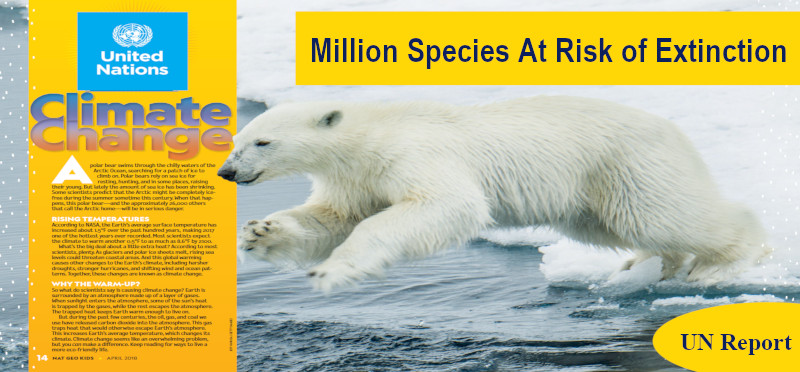
A global scale assessment in the health of ecosystems by a UN body has found that about one million species across the world facing the threat of extinction due to human-related activities.
In-Detail:
- An assessment report by the Intergovernmental Science-Policy Platform on Biodiversity and Ecosystem Services (IPBES) has noted that there is a rapid deterioration of ecosystems that we humans and other animal species depend upon.
- At this pace, the report expects that one million species will go extinct within the next few decades.
- It noted that the accelerated pace of extinction is tens of thousands of times more than the world faced in the previous 10 million years.
- It further stated that, even at global warming of 1.5 or 2-degree centigrade, terrestrial ecosystems will shrink drastically.
- Three-quarters of the terrestrial ecosystems and 66% of marine ecosystems are altered by human activities, says the report.
- The report is the most comprehensive scientific assessment of our nature to date.
About IPBES:
- Akin to the Intergovernmental Panel on Climate Change (IPCC) that prepares a report on climate change based on scientific evidence, IPBES does the same.
- It was formed in 2012 to provide a sustainability framework based on science.
- This is the first report of IPBES and can be seen as ‘Status of Nature’ report.
- 145 experts from 50 countries have participated in compiling the evidence and bring out the report.
- 15000 scientific and government sources and resources collected from indigenous and local knowledge has been reviewed for three years to prepare the report.
Five Drivers:
- The report ranks five direct drivers that have a major global impact on nature. They are:
- Changes in land and sea use
- Direct exploitation of organisms
- Climate Change
- Pollution
- Invasive alien species
- As per the report, these trends will continue till 2050 and beyond if transformative changes are not undertaken.
- The report has specifically noted that damage to ecosystems was minimal in areas where they are managed by indigenous people and local communities.
Also Read:
- Restricting Access to VAHAN Database – National Register e-Services
- Naming A Cyclone “Fani” – How Is It Done?
- The Threat of Superbugs Looming Large On The World
Conclusion:
- The devastating impact of human activities on the world is being reinforced by every other scientific report.
- The IPBES report is no exception.
- In its scope and scale, the report is similar to IPCC.
- For policymakers, the report will be a guiding post in bringing out policies and programmes to protect ecosystems.
- The report’s assessment that ecosystems fare well under the protection of indigenous people brings to the fore the importance of knowledge they hold and practices they follow in helping the ecosystems thrive.
It is here, the Indian government’s community reserves and Joint Forest Management are advantageous as indigenous people are involved in the ecosystem conservation efforts.

Leave a Reply
You must be logged in to post a comment.